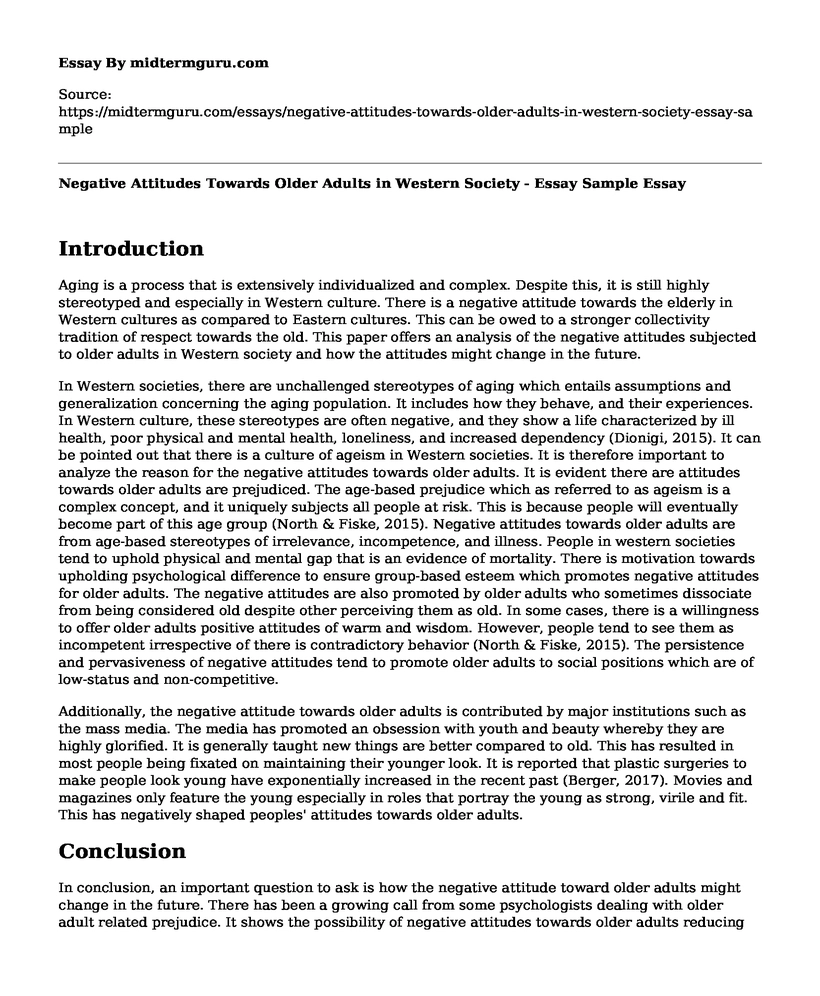Introduction
Aging is a process that is extensively individualized and complex. Despite this, it is still highly stereotyped and especially in Western culture. There is a negative attitude towards the elderly in Western cultures as compared to Eastern cultures. This can be owed to a stronger collectivity tradition of respect towards the old. This paper offers an analysis of the negative attitudes subjected to older adults in Western society and how the attitudes might change in the future.
In Western societies, there are unchallenged stereotypes of aging which entails assumptions and generalization concerning the aging population. It includes how they behave, and their experiences. In Western culture, these stereotypes are often negative, and they show a life characterized by ill health, poor physical and mental health, loneliness, and increased dependency (Dionigi, 2015). It can be pointed out that there is a culture of ageism in Western societies. It is therefore important to analyze the reason for the negative attitudes towards older adults. It is evident there are attitudes towards older adults are prejudiced. The age-based prejudice which as referred to as ageism is a complex concept, and it uniquely subjects all people at risk. This is because people will eventually become part of this age group (North & Fiske, 2015). Negative attitudes towards older adults are from age-based stereotypes of irrelevance, incompetence, and illness. People in western societies tend to uphold physical and mental gap that is an evidence of mortality. There is motivation towards upholding psychological difference to ensure group-based esteem which promotes negative attitudes for older adults. The negative attitudes are also promoted by older adults who sometimes dissociate from being considered old despite other perceiving them as old. In some cases, there is a willingness to offer older adults positive attitudes of warm and wisdom. However, people tend to see them as incompetent irrespective of there is contradictory behavior (North & Fiske, 2015). The persistence and pervasiveness of negative attitudes tend to promote older adults to social positions which are of low-status and non-competitive.
Additionally, the negative attitude towards older adults is contributed by major institutions such as the mass media. The media has promoted an obsession with youth and beauty whereby they are highly glorified. It is generally taught new things are better compared to old. This has resulted in most people being fixated on maintaining their younger look. It is reported that plastic surgeries to make people look young have exponentially increased in the recent past (Berger, 2017). Movies and magazines only feature the young especially in roles that portray the young as strong, virile and fit. This has negatively shaped peoples' attitudes towards older adults.
Conclusion
In conclusion, an important question to ask is how the negative attitude toward older adults might change in the future. There has been a growing call from some psychologists dealing with older adult related prejudice. It shows the possibility of negative attitudes towards older adults reducing (North & Fiske, 2015). However, despite introduced awareness, negative attitudes towards older adults might not change if American society persists on the ideas of individualism, materialism, and secularism. The notion will not change if social institutions such as mass media persist in negative representing old age as a stage that should be feared and avoided (Berger, 2017). This means that negative attitudes can only change if a culture of positively depicting older adults is promoted and that major social institutions support this stance.
References
Berger, R. (2017). Aging in America: Ageism and General Attitudes toward Growing Old and the Elderly. Open Journal of Social Sciences, 05(08), 183-198. doi: 10.4236/jss.2017.58015
Dionigi, R. (2015). Stereotypes of Aging: Their Effects on the Health of Older Adults. Journal of Geriatrics, 2015, 1-9. doi: 10.1155/2015/954027
North, M., & Fiske, S. (2015). Modern attitudes toward older adults in the aging world: A cross-cultural meta-analysis. Psychological Bulletin, 141(5), 993-1021. doi: 10.1037/a0039469
Cite this page
Negative Attitudes Towards Older Adults in Western Society - Essay Sample. (2022, Sep 06). Retrieved from https://midtermguru.com/essays/negative-attitudes-towards-older-adults-in-western-society-essay-sample
If you are the original author of this essay and no longer wish to have it published on the midtermguru.com website, please click below to request its removal:
- Essay on Why We Talk
- Analysis of Technical Descriptions: Memo Format - Paper Example
- Critical Essay on Sports Volunteering Articles
- Paper Example on Issues of Marriage and Sexuality in Christianity
- Resolving Workplace Conflict: Causes and Solutions - Research Paper
- Obedience: Key to Social Functioning - Essay Sample
- Effective Communication: Key to Successful Teaching & Learning - Essay Sample







